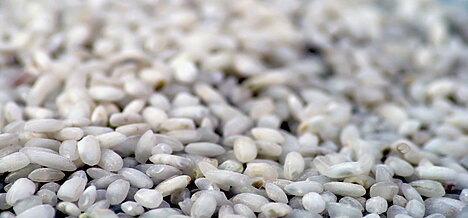Rice feed meal

Rice meal is a by-product of rice processing, consisting of the husks, germ and bran of rice. It has a high starch, fat, protein and fiber content and can be used to supplement a dog's diet. In this article, you will find out what rice flour for dogs is and how it works. We also look at the advantages and disadvantages that you should bear in mind if you want to feed your dog rice flour.
What is rice flour for dogs?
Rice meal is a fine powder that is obtained during the production of white rice. It contains the parts of the rice grain that are removed during hulling and polishing, such as the husk, germ and bran. These parts have a high nutritional value and contain many vitamins, minerals and trace elements that are missing in white rice. Rice meal has a high starch content of around 39 percent, which serves as a source of energy for the dog. It also has a high fat content of around 12 percent, which mainly contains unsaturated fatty acids that are good for the skin and coat. The protein content is around 11 percent, which is higher than many other cereals. Dietary fiber makes up around 5 percent and aids digestion.
How does rice flour for dogs work?
Rice flour can be a useful addition to a dog's diet if it is fed in moderation. It can be particularly helpful for dogs with digestive problems, allergies or increased energy requirements. Rice meal is easy to digest and does not burden the intestines. It can be used as a light diet in cases of diarrhoea or gastrointestinal inflammation, as it firms the stool and stabilizes the intestinal flora. Rice meal is low in allergens and is therefore suitable for dogs with a food allergy or intolerance. It can be used as a carbohydrate source in an exclusion diet, where only one protein and one carbohydrate source are fed in order to identify the allergenic substance. Rice meal provides a lot of energy in the form of starch and fat, which the dog needs for its activity. It can therefore be useful for dogs with high energy requirements, such as sports or working dogs.
What are the benefits of rice flour for dogs?
Rice food meal has several benefits for dogs that you can take advantage of if you feed it correctly. Here are some of them:
- Rice food flour is inexpensive and readily available. You can buy it at many pet food stores or online.
- Rice food meal is versatile. You can mix it with meat and vegetables or use it as a base for homemade treats.
- Rice flour is healthy and nutritious. It contains many important nutrients for dogs, such as vitamins, minerals and trace elements.
- Rice food meal is tasty and most dogs like to eat it.
What are the disadvantages of rice food meal for dogs?
Rice food meal also has some disadvantages for dogs that you should be aware of when feeding it. Here are some of them:
- Rice kibble meal should not make up more than 15 to 20 percent of your dog's diet, as meat should always be the main ingredient. Too much rice kibble can lead to obesity, diabetes or nutritional deficiencies.
- Rice meal should not be fed raw, as this can lead to flatulence or indigestion. It should always be cooked or swollen before it is given to the dog.
- Rice meal should only be organically grown, otherwise it may be contaminated with harmful substances such as arsenic. Arsenic is a toxic metal that is found in the water in some rice-growing areas and is absorbed by the rice. It can lead to symptoms of poisoning in dogs.
Rice meal is a beneficial food for dogs that has many benefits when fed correctly. It can improve digestion, alleviate allergies and provide energy. However, it should only ever be fed in moderation and in combination with meat and vegetables. You should also pay attention to the quality of the rice flour and only use organically grown products.
If you notice any signs of hypersensitivity or poisoning in your dog, you should see your vet immediately. We are not a substitute for a vet, but we try to be as accurate as possible. Every dog reacts differently and we recommend you get a second opinion or consult your vet if in doubt.
Stay healthy and take good care of your four-legged friend!😊